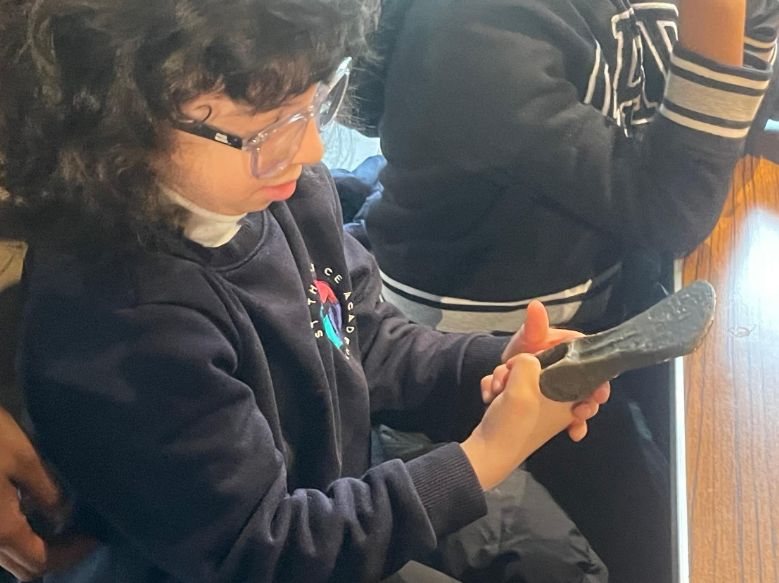Our Learning
History

Intent
At St Thomas, we believe that history stimulates children’s interest and understanding of the lives of people who have lived in the past and how this will shape our future. History also helps children to understand the complexity of people’s lives, the process of change, the diversity of society and relationships between different groups as well as their own identity and challenges of their time. We aim to develop children’s understanding of substantive concepts, which are revisited throughout different units and are identified in the overview below.
CUSP History draws upon prior learning, wherever the content is taught. For example, in the EYFS, pupils may learn about the past and present through daily activities, exploring through change, and understanding more about the lives of others through books and visitors as well as their own experiences. These experiences are drawn upon and used to position new learning in KS1. The structure is built around the principles of advancing cumulative knowledge, chronology, change through cause and consequence, as well as making connections within and throughout periods of time studied.
CUSP History is planned so that the retention of knowledge is much more than just ‘in the moment knowledge’. The cumulative nature of the curriculum is made memorable by the implementation of Bjork’s desirable difficulties, including retrieval and spaced retrieval practice, word building and deliberate practice tasks. This powerful interrelationship between structure and research-led practice is designed to increase substantive knowledge and accelerate learning within and between study modules. That means the foundational knowledge of the curriculum is positioned to ease the load on the working memory: new content is connected to prior learning.
The effect of this cumulative model supports opportunities for children to associate and connect with significant periods of time, people, places, and events.
CUSP History strategically incorporates a range of modules that revisit, elaborate and sophisticate key concepts, events, people, and places.
A guiding principle of CUSP History is that pupils become ‘more expert’ with each study and grow an ever broadening and coherent mental timeline. This guards against superficial, disconnected, and fragmented understanding of the past. Specific and associated historical vocabulary is planned sequentially and cumulatively from Year 1 to Year 6. High frequency, multiple meaning words (Tier 2) are taught alongside and help make sense of subject-specific words (Tier 3). Each learning module in history has a vocabulary module with teacher guidance, tasks, and resources.
CUSP fulfils and goes well beyond the expectations of the National Curriculum as we believe there is no ceiling to what pupils can learn if the architecture and practice is founded in evidence-led principles.

Implementation
In order for children to know more and remember more in each area of history studied, the lesson sequence is structured so that prior learning is always considered and opportunities for revision and retrieval of key dates, events and facts are built into lessons. For children to know more and remember more in each area of history studied, the lesson sequence is structured so that prior learning is always considered and opportunities for revision and retrieval of key dates, events and facts are built into lessons.
We have added 'do now' sections at the start of lessons that often revisit the key substantive knowledge taken from the linked knowledge organiser. Multiple choice quizzes also provide great opportunities to help make the key knowledge stick. This all allows for revision to become part of good practice and ultimately helps build a depth to children’s historical understanding. Through revisiting and consolidating skills, our lessons and resources help children build on prior knowledge alongside introducing new skills and challenge. Revision and introduction of key vocabulary is built into each lesson. This vocabulary is then included in knowledge organisers and knowledge notes, display materials and additional resources to ensure that children are allowed opportunities to repeat and revise this knowledge.
Through these lessons, we intend to inspire pupils and practitioners to develop a love of history and see how it has shaped the world they live in. It is important for children to understand that the past influences the present and the future. We want to encourage children to learn that they can’t change history but what they can do is learn about it and learn from it then use this information to help shape a better future.
Each lesson follows the CUSP structure:
-
Connect: Consolidation of previous learning- prerequisites visited to ensure prior knowledge is embedded.
-
Vocabulary: Explicit teaching of unit vocabulary.
-
Explain: Explicit teaching of new knowledge.
-
Example: Live Modelling of new learning (I Do.)
-
Attempt: Guided Practice of new learning (We Do) – Check for understanding.
-
Apply: Independent application of new learning (You Do.)
-
Challenge: Opportunities for deepening their learning and scientific enquiry.

"You learn from the past and compare it to today" - Year 3 child
"You get to learn about what they thought and what they invented or how it changed us today" - Year 4 child
Through these lessons, we intend to inspire pupils to develop a love of history and see how it has shaped the world they live in. It is important for children to understand that the past influences the present and the future. We want to encourage children to learn that they can’t change history but what they can do is learn about it and learn from it then use this information to help shape a better future.
Accompanying each module is a Knowledge Organiser which contains key vocabulary, information, and concepts which all pupils are expected to understand and retain. They support vocabulary and concept acquisition through a well-structured sequence that is cumulative. Each knowledge organiser supplies answers to questions that eventually link back to the cumulative quizzing, focussing on key content to be learnt and understood. Knowledge Organisers are dual coded to provide pupils with visual calls to aid understanding and recall. Knowledge Organisers are referenced throughout each module. Knowledge notes are locational points of reference communicating what pupils will KNOW. They communicate the lesson question supports explicit vocabulary instruction.
Impact
We want to ensure that history is loved by teachers and pupils across school, therefore encouraging them to want to continue building on this wealth of historical knowledge and understanding, now and in the future. Progression across the school can also be measured through key questioning skills built into lessons, child-led assessment (such as success criteria grids) and low-stakes assessment (such as retrieval quizzes and summative assessments), all of which inform and target next steps in learning.
Assessment for learning strategies: Think-pair-share, AFL corners, cold calling, show-me boards, and probing questions.
Exit Tickets link directly to each lesson, assessing everyone's individual understanding in every lesson and allowing for any misconceptions to be addressed in the next lesson.


"We know about things from other countries that you’ve never been to from pieces of evidence and photos" - year 2 child

